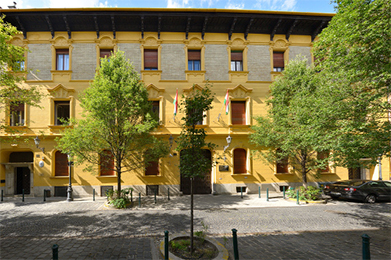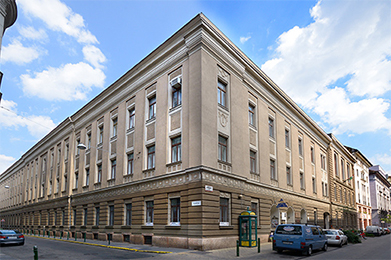Academic Calendar 2013/2014
OPENING CEREMONY
Date: 2nd September 2013 10 a.m.
Location: The Calvinist Church of Fasor, 7th district, Városligeti fasor 7
OPENING CEREMONY
Date: 2nd September 2013 10 a.m.
Location: The Calvinist Church of Fasor, 7th district, Városligeti fasor 7
In the framework of the Central European Exchange Program for University Students (CEEPUS), only the Faculty of Humanities entertains academic contacts with foreign universities. The Department of Dutch Studies is part of the CEEPUS network Language and Literature in a Central European context (coordinating institution: University of Vienna), with Dr. Tamás Balogh as Departmental CEEPUS Coordinator (This email address is being protected from spambots. You need JavaScript enabled to view it.).
The other research unit which participates in CEEPUS networks is the Department of General Humanities (Institute of Arts Studies and General Humanities). The departmental coordinator is Dr. Miklós Vassányi (This email address is being protected from spambots. You need JavaScript enabled to view it. ; tel. 30/831-9382). The Department of General Humanities is a member of the two following CEEPUS-networks: Study of Religions (coordinating institution: University of Szeged) and Inter-American Studies (coordinating institution: University of Graz).
Among the members of the Study of Religions network are Central-European universities like the University of Vienna, Masaryk University (Brno), Jagiellonian University (Kraków), Comenius University (Bratislava), the University of Szeged (Hungary) etc. The Inter-American Studies network comprises members as the University of Graz, the University of Zagreb, the University of Belgrade, the University of Ljubljana, and several more.
The CEEPUS networks offer an opportunity for instructors to teach for a week in foreign universities within the network, and to receive the visit of foreign instructors at their home universities. They also enable BA and MA students to spend entire semesters studying abroad while short study stays of one month and summer universities of one or two weeks are also possible. Application deadlines are in the middle of September and at the end of October; use the online registration and application forms at the dedicated website of the CEEPUS programme: https://www.ceepus.info.
If interested, please inquire at the above-indicated coordinators.
The University’s student residence is an independent institution providing services to the student population. It offers only a very limited number of rooms to the incoming students in the dormitory in Ráday Street. Every room is shared. There are places for two students in each room. The rooms are furnished and equipped with a little bathroom. The students have access to a kitchen and a recreational area with a TV-room. The rooms cost a gross of 30.000 HUF/month/person (cca. € 120,-) including sheets and blankets. Payments have to be made either by bank transfer or by cash.
The only way to apply for a room is to send the filled-in “Student Accomodation Form” to the International Office. (Address: H-Budapest 1091, Kálvin tér 9. Tel.: + 36 1 455 9060;
Fax: + 36 1 455 9062; e-mail: This email address is being protected from spambots. You need JavaScript enabled to view it. )
Unfortunately, as mentioned above, due to the limited number of rooms available, the International Office of the University is unable to guarantee that every Erasmus student will get a room in the student residence.
Students will be sent written notification stating whether or not their application has been succesful; this note will be sent to them together with the Application Form for Studies.
If you could not get a place in the University dormitory it is suggested that you rent a flat or share a rented flat, which is what most international students do.
The International Office of the KRE will provide all possible assistance to students in finding appropriate lodging.
“Rent a flat” agencies in Budapest:
http://www.bbcsite.it/public/siti/altracasa/
Head of Programme: Dr. Semsey Viktória - (Institute of History)
E-mail: This email address is being protected from spambots. You need JavaScript enabled to view it.
Organiser: Újlaky Judit - (Institute of Psychology)
E-mail: This email address is being protected from spambots. You need JavaScript enabled to view it.
Pál Fodor: Hungarian Perceptions of the Ottoman Empire
István Pelyach: 15 March – a feast to commemorate the Hungarian national identity
László Honti: Hungarians and the Origin of Hungarian - A Connection Between Identity and Language
Ferenc Szűcs: The Role of the Hungarian Reformed Church in the Political, Social and Cultural Life of Hungary
Ferenc Szűcs: Presentation
Viktória Semsey: Anti-empire plans in Europe in the 19th Century
Judit Újlaky: History of Hungary in the 20th Century in the Mirror of Political Jokes
László Borhi: Hungary in the Soviet Empire 1945–1956
István Szabó: Churches in Hungary after 1989
János László and Éva Fülöp: History as context of inter-group emotions
Dr A.L. (Ad) Tervoort: Ideology and religion in the formation of the Dutch overseas empire
Béla MAKKAI: The Austro-Hungarian Monarchy – “The prison of folks”?
Carlos SANZ: Exile and Migration
Carlos SANZ: From Empire to Nation
Zalán Bognár: Trianon and 1956 in in the mirror of Hungarian national identity
Margit BLASTIK: Empires of Fiction - Two novels with Turkish topic
Raquel Sánchez: Cultural market and cultural policy in 19th century Spain
Raquel Sánchez: The role of Catholic Church in the building of Spanish Empire, 16-18th centuries
„Empires, Nationes, Churches”
8-19th March, 2010
in Budapest
Teories about the Origen of Hungarian Lenguague and it’s Role in the Sociaty Reformes in the 18/19th Centuries
Lecturer: dr.Prof. Honti László - professor KRE
Hungary as a part of Turkish Empire
Lecturer: dr.Pál Fodor
Institute of Historian Studies of the Academy
Hungary in the Habsburg Monarchy
1526-1918
Lecturer: Dr.Prof. András Gergely - professor KRE
Departmento of Contemporary Hungarian History
The Austrian-Hungarian Monarchy – Is it „a prison of peoples”?
Lecturer: Dr. Béla Makkai - candidate
KRE Department of Contemporary Universal History
Plans Aganst-Empire in 19th century Europe
- Confederation Danube and Union Iberica –
Lecturer: dr. Viktória Semsey
KRE Department of Contemporary Universal History
Historical Trajectory and National Identity
Lecturer: Prof.Dr. János László
Professor University of Pécs, Institute of Psychology
Departmento of Social Psychology
On the Long Journey to National Holiday: March 15, 1848
- Searching for Identity and Lobbying for Political Interest -
Lecturer: István Pelyach
KRE Department of Contemporary Hungarian History
Empires of Fiction in some Hungarian Novels
Lecturer: dr. Margit Santosné Blastik
KRE Department of Foreign Languages
Music and National Identity
Roma Musicians and What They Played int he 19th and 20th Century in Hungary
Lecturer: Lázár Balogh
Conductor of Orchestra, Organist
Trianon 1920 and 1956 through Hungarian National Identity
Lecturer: Dr. Zalán Bognár
KRE Department of Contemporary Hungarian History
History of Hungary int he 20th Century through Political Jokes (a social psychological approach)
Lecturer: Judit Ujlaky
Department of Developmental and
Educational Psychology, KRE
The Role of the Hungarian Reformed Church in Cultural Preservation, in the Past and Today
Lecturer: dr. Kelemenné Márta Farkas
KRE Head of the Department of Foreign Languages
The Churches in Hungary after the Polictical Changes of 1989
Lecturer: Dr.István Szabó
Bishop, Danube Diocese of the Reformed Church
Continuing Trends and Challenges In Mission and Missiology:
Leadership Issues in Central and Eastern Europe
Lecturer: dr. Anne-Marie Kool
Head of Central and Eastern European Institute for Mission Studies of Univ. KGRE
Budapest
Portuguese Fado: an introduction
The Portuguese Discoveries
Lecturer: dr.Carlos Mauricio - Docente
Institute of History of University ISCTE, Lisbon
Portugal
The Modern Portuguese Empire: Building a colonial system in África 1822-1961
The Fall of the Empire 1961-1974
Lecturer: dra. Ana Mouta Faria - Docente
Institute of History of University ISCTE, Lisbon
Portugal
The Role of the Chatolic Church in the Building of Spanish Colonial System 16-18th Century
Cultural market and cultural policy in 19th Century Spain
Lecturer: dr. Raquel Sánchez García
Universidad Complutense
Departamento de Historia Contemporánea
Spain
From Empire to Nation-State: Spain and the World int he 20th Century,
Transnational population movements in Contemporary Spain
Lecturer: Dr. Carlos Sanz Díaz
Universidad Complutense
Department of Contemporary History
Spain
Fotoexposición:
„Three Disappeared Empires in the Now-Day Hungary”
By Diego García Martínez, actually Erasmus-student in Budapest, KRE
from the University Complutense, Madrid
The legal predecessor of our University was the Reformed Theological Academy of Budapest, founded in 1855 and granted University status by the Hungarian Parliament in 1900. In 1993 the General Assembly of the Hungarian Reformed Church took the decision to establish a multifaculty University, and this decision was approved later on in the year on 21st September by the Parliament of the Republic of Hungary. Through the creation of Károli Gáspár University, the Hungarian Reformed Church has fulfilled the aims of its forefathers. Our University, in the spirit of the universitas scientiarium, aims to raise the status of not solely the Church, but also the nation, through its educational, teaching and academic work.
The commitment of Károli Gáspár University is to carry on the distinguished traditions of the Reformed Colleges of Sárospatak (founded in 1531), Pápa (founded in 1531), Debrecen (founded in 1538), Kolozsvár (founded in1622) and Nagyenyed (founded in 1632). In addition to the education of ministers of religion, for the purposes of academic research, training for the position of lecturer and for the degree of Doctor of Philosophy, and the awarding of degrees, its aims and objectives are to provide BA and MA level basic education in several fields and branches of scholarship, and to be capable of carrying out academic research, in accordance with the aforementioned traditions and in the spirit of the Reformation.
The Hungarian Accreditation Committee, in Decision no.1 of June 6th 2000 regarding the standard of education and academic research carried out at Károli Gáspár University, granted our University accredited status as a result of the fact that our educational and research activities conform with the laws currently in force and are, additionally, in accordance with the Hungarian Accreditation Committee opinion and with their guidelines on educational standards.
Together, may we receive inspiration on the path to knowledge, morality or goodwill.


Every third level study involves a significant component, the participation in international education. Our University puts special emphasis on the opportunities for part-time studies as exchange programmes.
Numerous programmes of the European Union make active participation of students in mobility programmes possible. After the foundation of our University we first developed relationships with the Dutch region, but by now we have expanded our connections with the neighbouring countries, overseas and with religious and public universities all over the European Union.
We receive continuous financial and professional support from the Socrates and Lifelong Learning Programme/Erasmus, Leonardo da Vinci or CEEPUS programmes of the European Commission. Our University’s departments maintain mainly student and teacher mobility relationships but we do consider further developments like joint educational modules, curriculum development and the evolvement of new study programmes. Our aim is to strengthen the European dimension by the complete recognition of credits acquired abroad, the development of the quality of education and foreign language teaching, the extension of projects based on international relationships, the comparison of different educational structures and policies and the use of commonly gained insights.
 The Erasmus Programme
The Erasmus Programme
The Programme is named after the humanist and theologian Desiderius Erasmus of Rotterdam (1465-1536) whose travels for work and study took in the era’s great centres of learning, including Paris, Leuven and Cambridge. Like the man, the Erasmus programme places great importance on mobility and furthering career prospects through learning. By leaving his fortune to the University of Basel, he became a pioneer of the mobility grants which now bear his name.
Studies show that a period spent abroad not only enriches students' lives in the academic field but also in the acquisition of intercultural skills and self-reliance. Staff exchanges have similar beneficial effects, both for the people participating and for the home and host institutions.
Around 90% of European universities take part in Erasmus and 2 million students have participated since it started in 1987. The annual budget is in excess of €440million, more than 4,000 higher education institutions in 31 countries participate, and even more are waiting to join.
Objectives and actions
Erasmus has become a driver in the modernisation of higher education in Europe and inspired the establishment of the Bologna Process. The general aim of the Programme is to create a European Higher Education Area and foster innovation throughout Europe.
Erasmus became part of the EU's Lifelong Learning Programme in 2007 and expanded to cover new areas such as student placements in enterprises (transferred from the Leonardo da Vinci programme), university staff training and teaching for enterprise staff. The Programme seeks to expand its mobility actions even further in coming years, with the target of 3 million Erasmus students by 2012.
General Information
 Title of the programme:
Title of the programme:
Empires, Nations, Churches
-historical past, national identity, stereotypes, prejudices -
Characteristics: interdisciplinary
(history, psychology, music, film, literature)
Language: English
Date: 8-19 March, 2010. (on weekdays lectures between 9-12 am, discussion and cultural activity between 13.30 -17 pm)
Venue: Budapest, Gáspár Károli University of the Reformed Church (Central and Eastern European Institute for Mission Studies, III. Floor, 1091 Budapest, Kálvin tér 7.)
Credits: 5
Organisers:
Dr. Viktória Semsey (Institute of History) and Judit Ujlaky (Isnsitute of Psychology)
Participants: Hungary, Portugal, Spain, the Netherlands
For the detailed programme, please check “programme”.
The course offers lodging (twin bed rooms, 20 minutes from the programme venue) and half-board for free, pays also the airplane tickets (in cash during the programme; for administrative reasons we kindly ask our students and lecturers to keep their boarding cards). The cultural activities (museums, excursion on Saturday) and the public trasport weekly tickets are also paid.
Our students will have an access to the Ervin Szabó Metropolitan Library.
Required activities before and during the course:
(a) composing 3 8-10 item lists on the stereotypes and prejudices on the other three countries until 10 January 2010.
(b) handing in 3 papers (25-25 pages each, in the mother language) on the 3 other countries’ history and culture from the epoch of empires to 1989 – based on a 3-4 item bibliography defined by the organising lecturer in each country). Előre. ) The papers should be handed in until 15 February, 2010.
(c) On the last day of the course there is a test to complete in groups.
At the end of the course students receive a certificate on participation.
Courses offered in foreign languages:
Károli University offers several English-language courses that have been designed for Erasmus students in such fields as History, Religious Studies, Philosophy, Psychology, English, German, Dutch and Japanese Studies. In addition, two Hungarian language courses (beginner and lower intermediate) are available free of charge for the incoming students during their Erasmus stay at our institution.
Copyright © 2023 Károli Gáspár University of the Reformed Church in Hungary. All rights reserved.